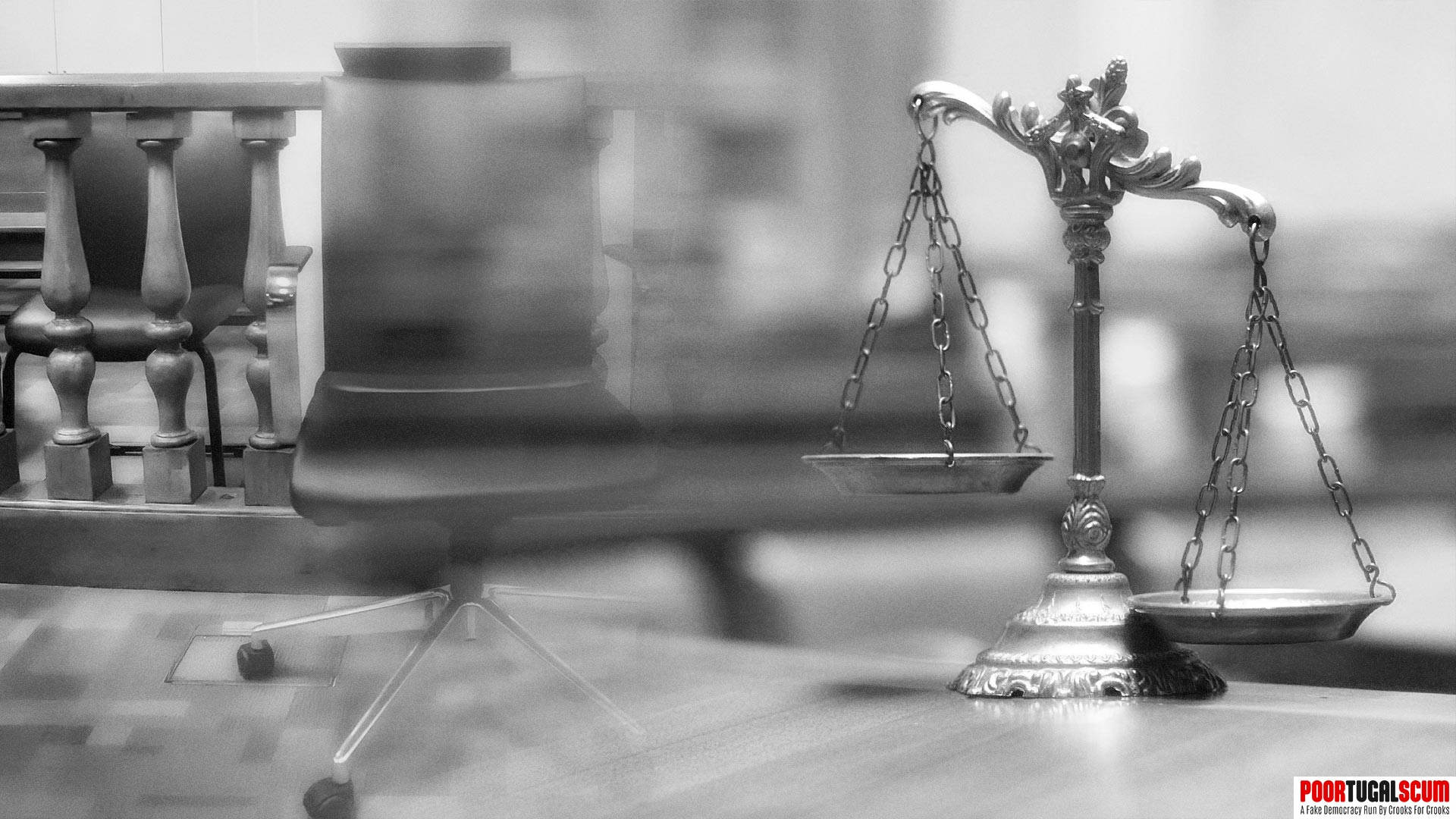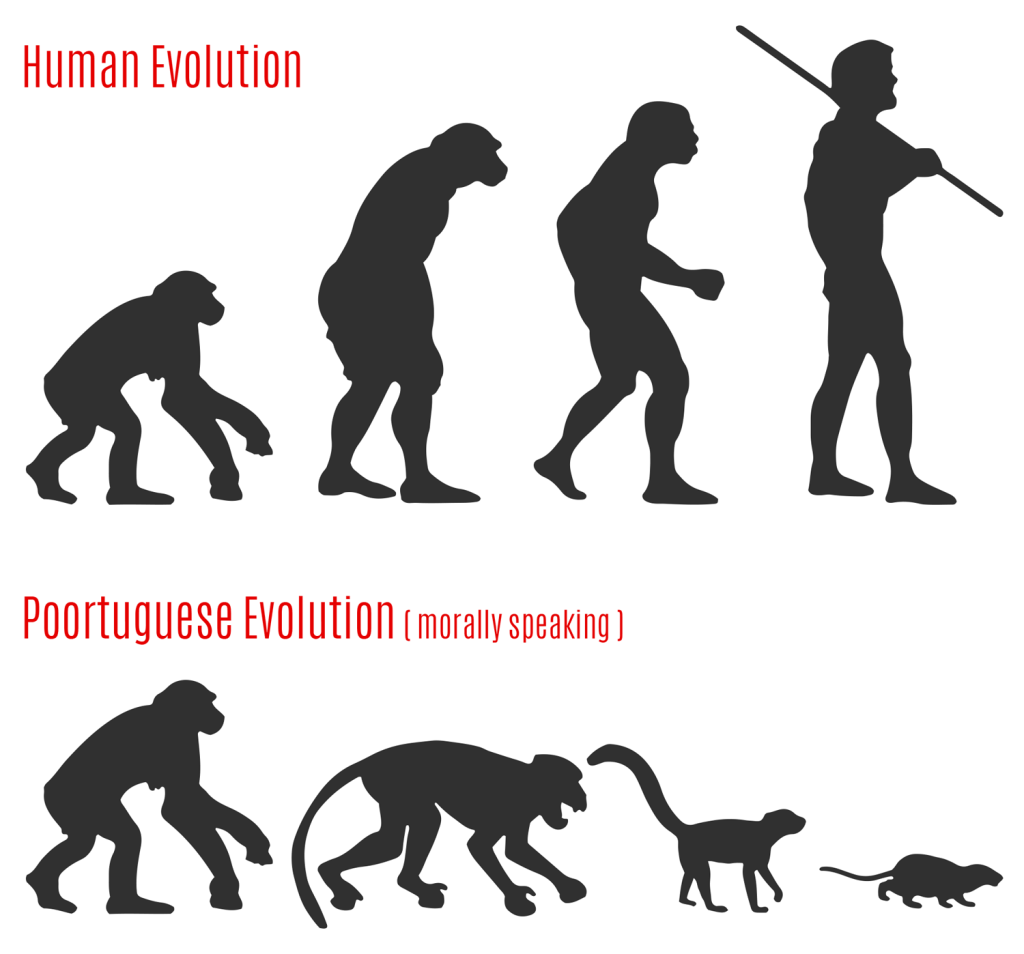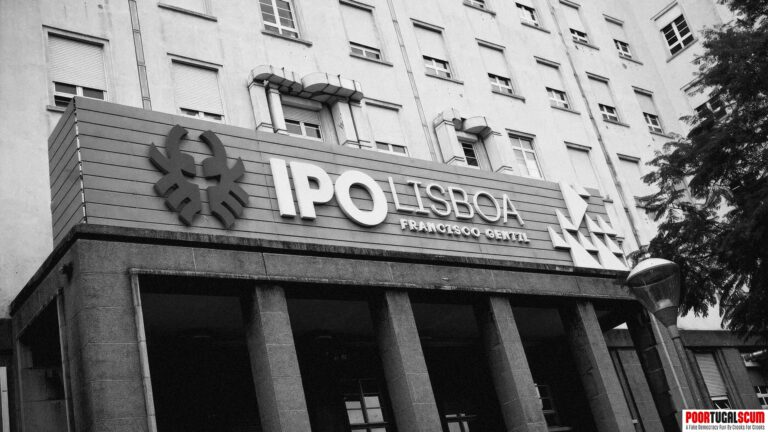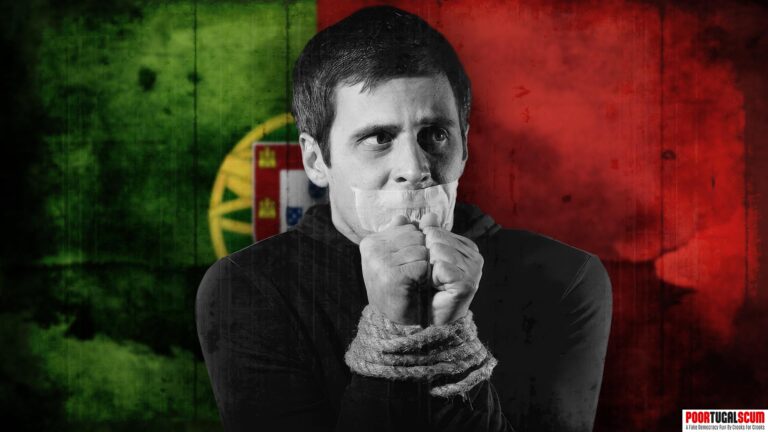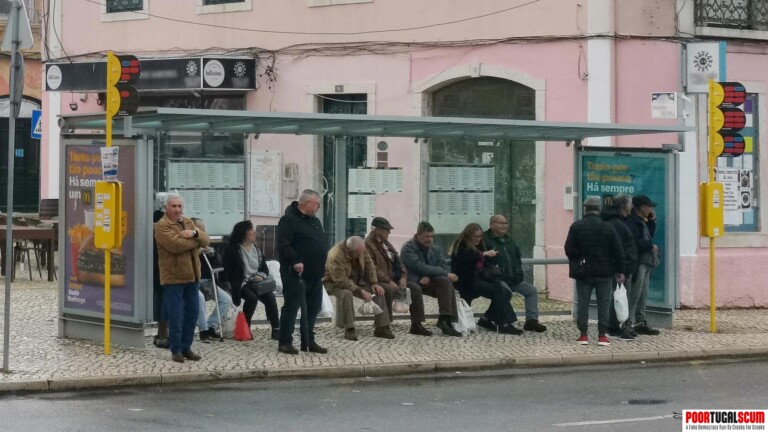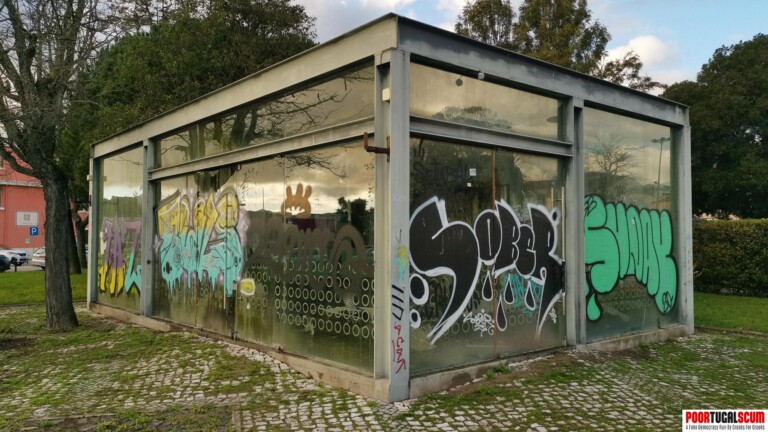It is very easy to conclude from this extensive news that Portugal is definitely a madhouse. However, it turns out that this is a problem that starts with the Portuguese mindset, for reasons as diverse as ingrained incompetence, laziness, sloppiness, dishonesty, disorganization, and the fact that the Portuguese generally don’t give a damn about each other, which results in a very dangerous place to live.
However, what is extremely serious here is to know that the Portuguese State, as a matter of fact, deliberately interferes with the Judiciary against its own citizens, which simply means that Portugal is not a democracy, but a consensual dictatorship nourished by idle citizens.
If there is no separation of powers in Portugal, there can be no democracy either. The EU must take a very serious look at what is happening in Portugal and take appropriate action.
The following article is a translation (mostly MT). You can find the link to the original website at the end of it.
Years go unanswered and it doesn’t have to be a complex or well-known case, such as the Casa Pia, Face Oculta or Operação Marquês cases. It is enough for the State to be the target of the conviction or to gain from the delay of the process.
It sounds like a lie, but it’s true. “In the Administrative Courts there are many processes, unfortunately, with 10, 15, 20 and 30 years, which are pending and you never know when they will end”, assumes to TVI/CNN Portugal Manuel Ramos Soares, president of the board of the Associação Sindical of Portuguese judges. And in these courts most of the cases are from anonymous citizens or small and medium-sized companies. There are those who die before knowing that the court is right and companies that close before winning cases in court.
But there are media cases that, due to the type of crimes, the complexity and the names they involve, also drag on for decades. Casa Pia, Face Oculta or Operação Marquês are three examples of how justice trips over itself. But if these processes, and others more or less publicized, are complex and involve economic criminality, there are others, with anonymous names, who remain in court. As it happens in administrative courts,
where the one who wins, at all levels, with the slowness of justice is the State itself.
“Over time I have had very old processes. I remember one, in Santiago do Cacém. I made a remedial order, which is a preparatory order for a process, which had entered when I entered high school. I was many years old”, recalls Manuel Ramos Soares, now a judge at the Porto Court of Appeal.
And it is in the Administrative and Tax Courts that reality is dramatic. “The administrative, the tax, there are big delays. Especially in the old processes, which were left behind and which the liquidator teams [created to reduce the volume of processes] have still not been able to resolve, due to a set of governmental and also management errors.
Then we talk about delays of 15, 20 years and even more”, he explains.
The president of the Regional Council of the Lisbon Bar Association, João Massano, reveals to TVI/CNN Portugal that he was aware “of a process that took so long that the Objectant – a single person – had already died when the favorable sentence came out”.
Official statistics do not hide the reality
And not even official statistics hide the frightening numbers of what happens in the courts. These are months that turn into decades, revealed by the Justice Statistics Information System. And here only the time that the cases spend in the courts of 1st instance is taken into account. Appeals to the higher courts are left out.
Average length of proceedings in the lower courts (in 2021)
Civil executions and labor executions take the most months. In the case of civil executions, the average time is 60 months, that is, five years. But, for example, in Santarém the average reaches 77 months (more than six years).
Work executions take an average of 53 months (more than four years), and there was even an improvement, since in 2018 the average was 84 months (seven years). However, in Viseu, it can reach 161 months (more than 13 years).
Average length of proceedings in administrative and tax courts of 1st instance (in 2021)
Looking at the Administrative and Tax courts, the numbers are surprising. In the administrative area, the challenge processes, for example, were at 191 months (more than 15 years). But in an item revealed by the statistics and which only refers to “other actions”, the number of months rises to 247 months (more than 20 years).
But this reality is not the only one and the penal area is a good example of how things can be faster, albeit with one exception. “Everything runs more or less quickly, apart from mega-processes, economic criminality and financial criminality, the more complex one, the famous ones, which never come to an end. In criminal courts, waiting times are very short”, guarantees Manuel Ramos Soares, despite the “carcinogenic processes, so to speak”.
“Administrative courts are the ones that condemn the state”
But what are the causes of this slowness? For the chairman of the board of the Associação Sindical dos Juízes Portugueses, in the administrative courts “there is a huge disinvestment, a lack of interest and the reason is also easy to understand”.
“The administrative courts are those that condemn the State. And the State organizes and provides the means. Therefore, for the State, the less the administrative courts function, the better “, he points out.
In addition, after a certain point, a reform “very beautiful on paper” ended up “filling the courts with competences for new processes”. For example, “they took with tolls on the motorways, with road accidents and I don’t know how many thousands of new processes”, says Manuel Ramos Soares. They were courts that “didn’t have staff, facilities, or structures, so that started to accumulate and it became more and more difficult”.
João Massano, president of the Regional Council of the Lisbon Bar Association, also has the same opinion: “Administrative courts exist to resolve judicial conflicts between citizens and the Public Administration,
with the State also being the main beneficiary of the cases that are decided there and that is for me the main reason for the delay in this type of process”.
“Recourse to administrative courts is very favorable to the State, if only because while the process goes back and forth, between administrative procedures, the State not only withholds, for example, the value of an alleged debt, but also charges a guarantee of 25% of that amount, and there are even cases in which the accused has to provide a guarantee or see his assets seized for a considerable period of time”, explains the lawyer.
And it goes further. “In fact, these State services use the administrative courts as an extremely efficient weapon, a case of ‘shoot first and ask questions later’, that is, however long the process takes, the State never loses, on the contrary. The individual or company targeted by the lawsuit has to pay, and in a substantial way, before even being able to explain, justify or prove the error of the accusation. If we add to this the costs of the process and the fees of a lawyer who accompanies these extremely complex processes, there is an enormous weight on who is the target of these”, stresses João Massano.
Let’s look at the case of appeals. We found, for example, requests for contestation of public procurement. Among the most varied situations we can be talking about doctors, teachers, civil servants or even companies that lost a tender.
But the challenge is also “related to taxes such as VAT, IMT and others”, explains to TVI/CNN Portugal António Marçal, president of the Union of Judicial Employees.
What justifies the slowness is also related, according to António Marçal, with “the lack of employees and the judges give few decisions”, in addition “there are some complex processes”. There are still “many requests for information to other entities”. But the biggest costs of this slowness are “in the image of justice and the money spent”, he argues.
A case in the first person
João Massano, despite being a lawyer and having experience in the field, was caught up in the days of the Administrative and Tax courts. “In terms of the cases I know, I can actually talk about a case in the first person,” he says. “When I was a partner at the law firm I joined, I was the subject of an administrative process that took more than 10 years and due to which I had my personal residence pledged as collateral, and even as the process progressed, the property was for sale . All motivated by a simple filling error in a declaration of beginning of activity. There was no infraction, only an irregularity of filling, to which the Tax Authority understood to add traces of illegality”, he describes.
Everything was resolved, but the lawyer has no doubts that the “case that could obviously have been clarified outside and before the courts, but attempts at clarification and rectification were always refused”.
Of the cases that have already “passed through his hands”, he recalls other examples: “I had two IRC processes that were at the Sintra TAF – IRC from 1998, in one case, and IRC from 1999 in the other. Judicial challenges were presented in 2003. In one of the cases, the favorable decision handed down at first instance became final in 2021. In the other case, the favorable judgment given at first instance became final in 2022. In other words, these two processes took 18 and 19 years, respectively. Of course, appeals were filed, but it is unacceptable that a process takes almost 20 years to be resolved.”
In addition, he also says that he has several cases of companies “that had to close down their activity due to tax debts because the processes were never concluded” even though, in the end, they “ended up winning”. “Except that there was nothing to do anymore because the companies had been closed for several years”, concludes João Massano.
“Laws are not made for things to go too fast”
In addition to the courts, “there are also problems with the laws of process.”
That is, explains the disembargator judge Manuel Ramos Soares, “the laws could also be faster, give more powers to the judge to, at certain times, put an end to maneuvers that only aim for the process to go backwards and forwards and that it does not reach the end”.
In some way, the origin of the laws can also explain some things. “Laws are made in Parliament, a third of Parliament is lawyers. We were creating this idea that the justice system should distrust the judge and, therefore, one does not want to attribute powers to the judge”, he considers.
“When you see requests for this and that, asking for the judge to be removed, for the order to be clarified, for this and that to be void after ten years, whose responsibility is it?”, asks Manuel Ramos Soares. “Laws are not made for things to move very quickly”, he laments.
“Defendants able to pay thousands of euro”
As for the more mediatic cases that drag on for several years, the judge recalls that “the media coverage of a case does not depend so much on a case, it depends on the quality of the defendant and the subject falling, for whatever reason, in the press”. Even because there are cases with well-known people who never make the news because “no one passed on the information”.
And these “volume, complex processes, with lawyers with many resources, but above all with defendants with the capacity to pay thousands and thousands of euros in costs, incidents, lawyers, take the same amount of time”.
Faced with the negative image that media cases give to Justice, Manuel Ramos Soares explains how he would resolve the issue. “Appeals to the Court of Appeal take three, four months on average. Our response time is one of the shortest in Europe. Afterwards, he went to see Face Oculta and had two and a half years in Relação or three. In that court, the processes take three months, why did this one take three years? Go there and see.”
More than the money spent, the president of the Associação Sindical dos Juízes Portugueses regrets another loss when it comes to mega-processes: “It is above all a price of trust. It is evident that justice spends more money, the country spends more money on a trial that takes three years than one that takes a year. But that is not the main problem, the problem is the cost of trust that this has.”
The slowness of justice in the Administrative and Tax courts is a cause for concern for João Massano, who has no doubt that “most people/companies do not have the financial capacity to withstand this unequal fight”. “And in the end, it’s all of us who lose, with the general distrust of justice agents, with lawyers also being caught, without responsibility, in the middle of this network.”
The “despair” of the citizens
In 2017, a study was published, carried out by the Permanent Observatory of Justice, which referred to the many problems of the Administrative and Tax courts and which made several recommendations. More than five years later, the conclusions remain current.
“In all the courts where fieldwork was carried out, there were several reports of pressure and even despair, from citizens who wait long years to obtain a judicial decision, and who turn to the courts and other entities, such as the Council Superior of the Administrative and Fiscal Courts (CSTAF) and to the Justice Ombudsman, in an attempt to speed up the resolution of their case. And citizens and companies that have bank accounts and pledged assets may be in this situation, of dismay or even despair, because they have not been able to pay the taxes they are contesting, nor provide a guarantee, or, by providing it, they are paying high charges, or who are faced with contracts that do not materialize; civil servants awaiting a decision regarding their employment situation; pensioners; citizens who are victims of road accidents or medical negligence, among many other situations”, can be read in the conclusions.
Since then, little or nothing has changed. And if in some cases there were improvements, in others the situation got worse.
The history of the most mediatic cases in Portugal
Casa Pia, Face Oculta and Operation Marquês are three examples of media cases that still walk through the corridors of the courts and insist on being in the news.
Casa Pia: still pending resources
More than 20 years after its inception, the Casa Pia process still has appeals pending, making it one of the longest to go through the country’s courts. By the names involved, the crimes involved, the complexity of the process. These are some reasons that help explain two endless decades.
“The Casa Pia process was, to date, the longest in Portuguese judicial history. It demonstrated the fragility of the judicial system,
as well as evidence of the interference of political power in the judicial power”,
said Miguel Matias, lawyer for the victims of Casa Pia, at the end of last year.
As for the length of the case, Miguel Matias had no doubts in stating that “it was motivated by the declaration of the special complexity of the process, which allowed the enrollment of around 900 witnesses”.
Carlos Cruz still has a complaint pending before the European Court of Human Rights against the Portuguese State and an appeal to the Supreme Court of Justice, after being condemned last September 15 by the Lisbon Relation to the payment of two compensations of 25 thousand euros to two victims (50 thousand euros in total).
At the same time, Ricardo Sá Fernandes, Carlos Cruz’s lawyer, stressed that “20 years have passed, but the Casa Pia process is still not closed”, recalling that “Portugal was condemned by the European Court of Human Rights for not having guaranteed, in terms of with regard to Carlos Cruz, the right to a fair trial”, which, in his understanding, “in the context of a review appeal, should imply the right to a new trial”.
“Unfortunately, the Portuguese courts did not understand this, which is why, in June 2022, a new complaint was filed with the European Court of Human Rights, which, admittedly, is pending consideration and judgment”, he argued.
Regarding the payment of compensation to an alleged victim of crimes and of which Carlos Cruz was acquitted, the lawyer explained that “there was a copy-paste error, whose correction was requested and is pending consideration in an appeal filed with the Supreme Court of Justice”.
Operation Marquês: eight years after his arrest, José Sócrates has not yet gone to trial
On November 24, 2014, José Sócrates, former prime minister, was arrested at the exit of Lisbon airport, on his way back from Paris. Eight years later, he still hasn’t been tried. It is a case to say that this could still become the longest process of Portuguese justice.
In October 2017 alone, charges were filed against 28 defendants, for a total of 188 crimes. Among them big names: José Sócrates, Zeinal Bava, Henrique Granadeiro, Ricardo Salgado, Armando Vara and Carlos Santos Silva.
The former prime minister was accused of 31 crimes, including three crimes of passive corruption of a political office holder, 16 of money laundering, nine of falsification of documents and three of qualified tax fraud.
19 defendants requested the opening of the instruction phase. It remained in the hands of Judge Ivo Rosa. The instructional debate began in March 2020 and ended on July 2 of the same year.
In April 2021, Ivo Rosa presented the verdict of this procedural phase. Of the 28 defendants, only five were pronounced. And of the more than 180 crimes charged by the Public Ministry, only 17 remain, distributed by José Sócrates, Carlos Santos Silva, João Perna, Armando Vara and Ricardo Salgado.
Two of them, because the cases were separated, have already been convicted in the first instance. On July 13, 2021, Armando Vara was sentenced to two years in prison for the crime of money laundering. And on March 7, 2022, Ricardo Salgado was sentenced to a total prison sentence of six years for three crimes of breach of trust.
José Sócrates has not yet been tried for the six crimes he was convicted of: three for document forgery and three for money laundering.
Face Oculta: from the investigation to the arrest, 10 years passed for Armando Vara
The investigation of this case started in 2009 and the trial started in 2011. It lasted two years and ten months.
All 36 defendants were convicted in the first instance in September 2014. Armando Vara sentenced to five years in prison, was the best known name, but he was not alone. Manuel Godinho, José Penedos and Paulo Penedos, Paiva Nunes, were also convicted. Most appealed.
The Porto Court of Appeal confirmed the convictions. Vara’s sentence was five years in prison. Manuel Godinho, on the other hand, had his sentence reduced to 15 years and, later, the Supreme Court of Justice reduced it to 13 years.
With all appeal possibilities exhausted on January 16, 2019, Armando Vara turned himself in at Évora Prison.
Businessman Manuel Godinho, on the other hand, presented himself at the Vale do Sousa jail in November 2021 to serve the 12-year sentence to which he had been sentenced.

